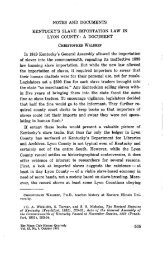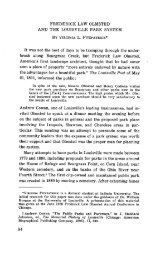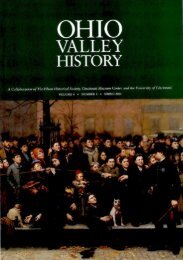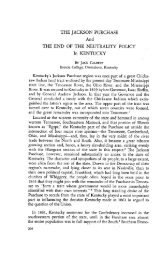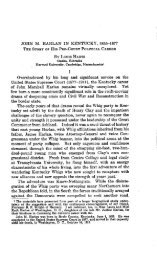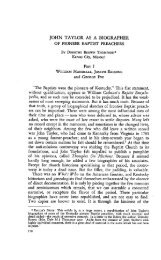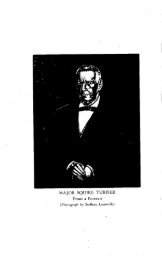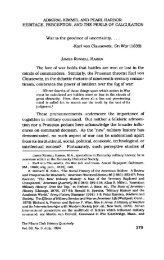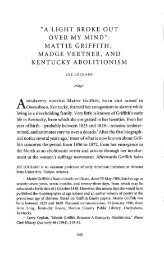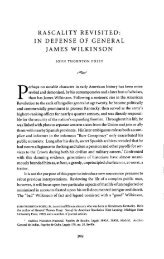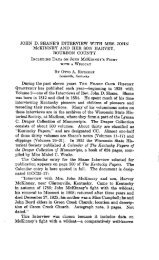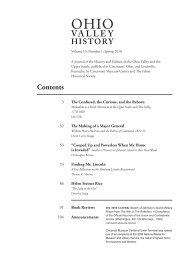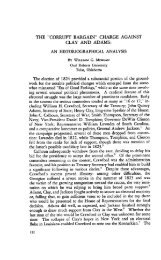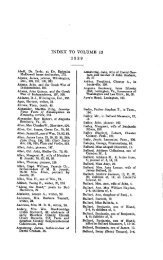ROBERT J. BRECKINRIDGE DURING THE CIVIL WAR Robert ...
ROBERT J. BRECKINRIDGE DURING THE CIVIL WAR Robert ...
ROBERT J. BRECKINRIDGE DURING THE CIVIL WAR Robert ...
You also want an ePaper? Increase the reach of your titles
YUMPU automatically turns print PDFs into web optimized ePapers that Google loves.
<strong>ROBERT</strong> J. <strong>BRECKINRIDGE</strong> <strong>DURING</strong><strong>THE</strong> <strong>CIVIL</strong> <strong>WAR</strong>BY HAMBLETON TAPPInstructor of American History, Louisville Male High SchoolAn address before The Filson Club, December 7, 1936.<strong>Robert</strong> Jefferson Breekiaridge, D. D., aside from being theoutstanding leader of the Union cause in Kentucky during theWar Between the States, achieved eminence in other fields thatsecured him a prominent place in Kentucky history. He was oneof the Southern pioneers in the field of gradual emancipation ofnegro slaves; he was the father of Kentucky's public schoolsystem, and one of the outstanding leaders of the PresbyterianChurch in America; he was a giant in intellect, a wizard ofscholarship, a paragon of eloquence, a master of logic, and acolossus in debate.• Colonel W. C. P. Breckiuridge was his sonand Desha Breckinridge his grandson. Another grandson is Dr.Scott D. Breckiuridge.<strong>Robert</strong> J. Brecldnridge was born in 1800 at the Breckinridgehomestead, Cabell's Dale, near Lexington, Kentucky, and educatedat Princeton, Yale, and Union colleges. At Lexington, in1824, he took up the practice of law and became unusually successfulin this profession. During the '20s the young attorney enteredpolitics, allying himself with the Whigs; he became also a leaderin the Old Court Party of that period. An extended and dangerousillness, in 1829, following the loss of two children, caused hisreligious feelings to deepen. This resulted in his decision to takeup the ministry; he therefore returned to Princeton for theologicalstudy. Two years later he accepted a call as pastor of theSecond Presbyterian Church of Baltimore, which charge he heldfor thirteen years. During that time Dr. Breckiuridge becameperhaps the outstanding champion of the Old School group of thePresbyterian Church. In 1847 he was chosen pastor of the FirstPresbyterian Church of Lexington, Kentucky; however soonthereafter he was appointed Kentucky's first Superintendent ofPublic Instruction. The Presbyterian Church established a•Lewis and Richard H. Collins, History of Kentucky, 2 vols., 683 and 801 pages,Covington, Kentucky, 1874 and subsequent reprints. The reference is to Vol.1,pages 477-479; also Courier-Journal, Louisville, December 29, 1871; also The DailyPress, Lexington, December 29, 1871.
1937] <strong>Robert</strong> J. Breckinridge during the Civil War 121theological seminary at Danville in 1852, and thither Dr. Breckoinridge went as instructor, soon after which he acted as the headof the school. His connection with this seminary .continued untilabout the time of his death in 1871. During his early manhoodDr. Breckinridge came into possession of approximatelythree hundred and fifty acres of land. This estate was given thename Braedalbane. Here he spent most of his summer vacations.The Doctor was thrifty enough to cause the estate to beprofitable. He seems to have chosen industrious and trustworthyoverseers, who, in turn, did not permit the slaves to shirk.Dr. Breckinridge was married three times. His first wife wasSophronisba Preston, who died in 1844; his second wife was Mrs.Virginia Hart Shelby, who died in 1859; and his third wife wasMrs. Margaret Faulkner White, who survived him. No childrenwere born to the third union; however, to the first and secondunions fourteen children were born.,APPEARANCE .AND PERSONALITY. At the beginning of theWar Between the States, Dr. Breckinridge was sLxty-one years ofage. His figure, tall, slender, and clad in dark canonicals, wasimpressive in dignity and gravity. The head and face weresingularly striking: A long full beard, altogether white, grewfrom his chin, almost hiding the mouth, and dark gray sidewhiskersclung to thin scholarly cheeks. Long thick gray hair,which had not receded with age, grew bacl•vard from a not massiveforehead. Hanging well down his long, finely formed nosewere quaint steel-rimmed spectacles, and beneath severe grayeyebrows were fixed unusual eyes. These eyes were at oncethoughtful, sorrowful, and troubled; they seemed to look awayinto another world--a stange, mystic, troubled world, where theAncient Mariner or the Prophet Isaiah might have traveled:The face as a whole was a determined one, expressing somebitterness, some grimness, some disappointment--a face that hadknown suffering--yet it was distinguished and not devoid of"sweetness and light.",The personality, although powerful and well defined, wascomposed of numerous qualities, many of which sharply con-2John Mason Brown, Memoranda of The Preston Family, published by S. I. M.Major, Frankfort, Kentucky, 1870, pp. 11, 12. Also Breckinrldge Manuscripts,1860-1865 (which consist principally of the letters received by John Breckinridgehis son <strong>Robert</strong> Jefferson, and his grandson William C. P.) in the Manuscript Divisionof the L brary of Congress; they run t•rough the nineteenth century.*William H. Townsend, Lincoln and His Wife's Home Town, IndianapolisIndiana, 402 pages, 1929. See pages 347-352 for another description and a p ctureof Dr. Breekinridge.
122 The Filson Club His$ory Quarterly [Vol. 11tradicted, causing difficulty of analysis. Back of it was a brilliantintellect, which through the years had avidly delved into therealms of knowledge, until the possessor was master of a scholarshipsecond to few of his time., Dr. Breckinridge's warmestfriends considered his superior intellect as God-given, while hisenemies were apt to speak of it as a Satan-like brilliance.It will be easily percieved that Dr. Breckinridge's personalityconsisted of elements which made both warm admirers and implacablefoes. On the one hand, he was superindowed with impeilentsto combativeness, irritability, impulsiveness, irascibility,prejudice, bigotry, a desire to hold the "spot-light" and apenchant for plunging into controversy. These characteristicscaused enemies to spring up, enemies as innumerable as thefruits of the fabled dragon's teeth.6 On the other hand, theDoctor possessed qualities of kindness, humor, charity, affection,courage, sympathy, patriotism and a capacity for love (as deep ashis capacity for hate) all of which blended s(• felicitously andshowed so attractively that legions of friends and partisans wereready at all times to defend him.+One critic said of him: "He lived not for himself . . . Hespent his life advancing what he thought the best interests of hisfellowmen, his state, and his nation.''7Another wrote: "The history of the present war affords nomore flagrant instance of infidelity and treachery to politicalprinciple than is presented in the record of Dr. <strong>Robert</strong> J. Breckinridge."8The charm of his personality showed most delightfully in conversation.On such occasions his humor was rich and brilliant,and his manners were thoroughly polite, soft, kind, dignified,and free. So scintillating was his conversation and so captivatingwas his manner that most women were readily fascinated byhim.,Controversy seemed to be essential to his existence; to him itwas the bread of life, the essence of happiness. In this hebrought into play remarkable powers of pen and voice, with tellingeffect. His trenchant, terse, and lucid style of writing and4Courier-Journal, December 29 1871; also Collins Kentucky, Vol. 1, p. 479.6Louisville Daily Journal, 1864, espec ally May 5, 6, 23, August 4, and October 26,1864.+Collins, Kentucky Vol. 1, pp. 477-479.'The Daily Press, •xington, December 29, 1871.ILouisville Daily Journal, August 4, 1864.tInterview with Mr. Calvin M. Fackler, Danville, Kentucky, September 20, 1936.
1937] <strong>Robert</strong> J. Breckinridge during the Civil War 123speaking, his superb powers as logician, his vivid imagination,together with remarkable energy, courage, and scholarship--these aided mightily in making him one of the most formidablecontroversialist of his time.'°It was a part of Dr. Breckinridge's nature to be positive anddogmatic. He had deep convictions on practically every subjectwhich he had studied, and he seldom compromised. For him tocompromise was, from his point of view, wrong, because he felt hewas right and therefore should not compromise; and he couldalways bring logic into play, not only to prove the rectitude of hiscontentions, but to blast the "pretention" of his foes. Moreover,the Doctor believed that his assertions were the opinions andwill of God, which, therefore, is one reason for his" habit ofspeaking boldly and with absolute confidence.Perhaps no summary of Dr. Breekinridge's personality shouldbe attempted. One can not say truthfully that his personalitywas constantly dominated by this or that trait, although therewere certain characteristics in his personality, such as his fondnessfor controversy, that were usually detectable. Not only was itdeveloped by a score of elements but, as Judge Samuel M. Wilsonsuggests, during different periods different attributes were in theascendancy; moreover, his Peter-like impulsiveness led him to bedevil and angel within the twinkling of an eye.,, There is, however,little disagreement concerning his intellect and his scholarship,which were pre-eminently brilliant in a century of scintillatingand profound intellectual achievements. In the words ofGeorge D. Prentice: "Much of his writing was worthy of one ofthe predominent minds of the country and the age,'U, and that"It is the fortune of Dr. Breckinridge to impart greater currencyto great discourses than any other man in the Republie."l,FAMXLr. In order to understand the career of Dr. Breckinridgeduring the Civil War, one must study three phases of hislife during this period: his relationships with his family, with hischurch, and with politics.During the War, Dr. Breekinridge lived singly, his secondwife, Mrs. Virginia Hart Shelby Breckinridge, having died in theyear 1859 at Danville. At this time there survived from his firstunion eight children, all of whom were grown, Living with him1°Collins, Kentucky, pp. 477-479.nLoui•vill• Daily Journal August 4 and October 26, 1864.lSIbid., March 4, 1861.lSlbid., June 18, 1861.
124 The Filson Club History Quarterly [Vol. 11was his son "Johnny," the only living child of his second marriage.The surviving children of the first union were <strong>Robert</strong> J.;William C. P.; Joseph C.; Charles (who shortly before the outbreakof the Conflict entered Princeton, transferred to WestPoint, and became an officer in the Union army) ; Mary, wife ofWilliam C. Warfield, of Lexington; Sally, wife of the ReverendGeorge Morrison, of Cynthiana, Kentucky; Sophronisba, orSophy, wife of Dr. Theophilus Steele, a physician of Lexington;Marie, wife of William C. Handy, a Presbyterian minister ofPrinceton, New Jersey. There was also a stepdaughter, SusanShelby, wife of Colonel J. Warren Grigsby.l,The two eldest sons, Bob and Billy, fine, promising young lawyersof Danville and Lexington, early in the War enlisted in theConfederate army, both becoming colonels, W. C. P. (Billy) inGeneral John H. Morgan's brigade. Joseph, a light-hearted,high-spirited young man, enlisted in the Union army in the fall of1861 and was attached to the staff of General George H. Thomasas lieutenant. William C. Warfield was a prominent stockraiser and business man of Lexington, and one of the leaders ofthe Union cause in the Bluegrass region. Dr Steele was a fieryyoung man with irrepressable Southern sentiments; he became amajor under General Morgan. Susan Shelby's husband was theColonel Grigsby, mentioned so frequently by Basil Duke in hisHistory of Morgan's Cavalry.l•Dr. Breckinridge, the recognized, the uncompromising leaderof the Union cause in Kentucky, was deeply affected by thedivision in his family.,, Sometimes, on contemplating the tragedy,grief would all but overwhelm him; at other times wrathwould be in the ascendency; then resignation would eome,•T followedby a calm determination to do his duty regardless of histies of kinship and affeetion.•8 It was a terrible blow to himwhen the two sons, Bob and Billy, rode South in gray. But somerelief came when Josy joined the Union army and was commissioneda second lieutenant. This stimulated his pride andcaused his heart to overflow. The display of Josy's blue uniform14Brown Memoranda of Th• Preston Family, pp. 11, 12; also Breckinridge Manuscripts,1860-1865; also Collins, Kentucky, VoL 1, pp. 477-479; also Kentucky Reports,B. Monroe XII pp. 629• 630, and I, pp. 266-268.15Various letters referring to the War activities of <strong>Robert</strong>, William, and JosephBreckinridge are in the Breckinridge Manuscripts for the years 1860-1865.lelbid., October 31, 1861.171bid, July 19 1862.llLouisville Da•ly Journal, January 11, 1861; also Lexington Observer and R•porter,May 24, 1862.
1937] <strong>Robert</strong> J. Breckinridge during the Civil War 125was a pleasing sight to him, and, although "Scotch," the dotingfather saw to it that this son's desires in sartorial military elegancewere gratified.,, The old man was elated when, after theBattle of Mill Springs, January 19, 1862, the name LieutenantJoseph Breekinridge was cited by General Thomas for efficientservice as aide.,0The fact that Confederate Bob and Billy had weB-nighbroken the Union-loving Doctor's .heart did not deter himfrom assuming their domestic burdens which, under the circumstances,were in no wise duties of his. He cared for <strong>Robert</strong>'swife, for Dr. Steele's wife, and in many ways helped Billy's wife,Isa, daughter of Dr. Desha. Nor did his tendency towardparsimony enter into his dealings with any of his children andtheir families, when it was possible, honorably, to give themfinancial assistance.,,Although accused of being too cold-hearted to raise a hand tosave Confederate relatives from a firing squad,,, Dr. Brcekinridge,throughout the War, received requests from them andnever failed to help when he felt that help was justified and whenit could be done without traducing his friendship with PresidentLincoln. A few examples of these requests, many of them frantic,are here presented to indicate the variety of calls'for helpwhich the Doctor was asked to give:,,Mrs. Carrington, aunt of Billy's wife, implored him to obtainpermission to see her Confederate soldier-prisoner son, Jimmy,incarcerated at Fort Delaware, after which she would, she declared"return unmolested to my own fireside where I may spendthe rest of my life praying for the peace of my country." Mrs.Joshua F. Bullitt begged Dr. Breckiaridge to intercede withGeneral Stephen T. Burbridge to save her husband, Judge Bullitt,from banishment. Henry Waller pled for help to use his influenceto secure the release of his son, David Waller, who hadbeen captured as a Confederate spy. Mrs. Eliza Johnston solicitedDr. Breckinridgc to obtain a pass for her through theFederal lines to visit her husband, J. Stoddard Johnston, whomshe had not seen for two years. Judge S. M. Brcekinridge senta°Breckinridge Manuscriptsj autumn.1861, and August 6, 1862.teThe War of The Rebellion: Offtcial Recor& oJ The Union and Con]ederate Armies•128 Vols.• 1880-1901, Series I, Vol. V/I, pp. 562, 563; also p. 79.•Breckmridge Manuscripts, 1860-1865.i•E. Merton Coulter Civil War and Readjustment in Kentucky, The University ofNorth Carolina Press, Chapel Hill, North Carolina, 1926, 468 pages, pp. 234, 235.2•rhese examples are taken from letters con•tainedscripts, 1861-1865.in the Breckinridge Manu-
126 The Filson Club History Quarterly [Vol. 11an urgent appeal to the harassed Doctor to act quickly in behalfof John B. Castleman, who had not been exchanged and who wasto be tried on serious charges by a court-martial. Many of therelatives and friends whose requests could not be granted, damnedand maligned him so viciously that Job himself, under similarcircumstances, likely would have sworn.,,Dr. Breckinridge, moreover, was continuously in difficultiesbecause of the difficulties of members of his immediate family.Major Steele was captured in November, 1864, near Cynthiana,while recruiting for the Confederate army within the Federallines; he was also alleged to have been associated with the notoriousscoundrel, Mose Webster, who had robbed a store at Williams°town, Kentucky, of $2,000. Major Steele was imprisoned atLouisville,,• and immediately application for assistance was madeto Dr. Breekinridge. The Doctor replied: "The distress of mydaughter breaks my heart, but the fact that Major Steele is myson-in-law, to whom I am personally devoted, entitles him to nomore consideration than any other rebel soldier."s* But whenthe strong-willed divine learned that his son-in-law had beenironed, placed in solitary confinement, and that hanging as aguerrilla was imminent, his attitude ehanged quickly. He appealedto the Federal authorities at Louisville, to treat MajorSteele an ordinary prisoner of war, but they were obdurate.Then he denounced them soundly and declared that he would appearas Steele's counsel at the court-martial. But believingthis proceedure too slow, the Doctor, his fighting blood high, dispatchedJudge William C. Goodlow and a delegation from Lexingtonwith a letter to the President. The kindly Lincoln readthe first few lines, took paper and pen, scratched an order, andsoon Major Steele was an ordinary prisoner of war.s•Threats to kidnap his beloved little Johnny brought anguishto Dr. Breekinridge, who throughout the greater part of the Warwas subject to ill health. These threats had begun as early asthe autumn of 1862. In September 1864, near the time of hisfourteenth birthday, Johnny disappeared. The Doctor wasgreatly distracted. He aroused the entire section, and Federaltroops were marshalled for action. Shortly afterwards, however,news arrived from Danville that the run-away, mounted on the•4Louisville Daily Union Press• February 15, 1865. In this issue a letter writtenby Dr. Breckinridge is referred to.25 " .Breckmrldge Manuscripts, November, 1864.*eWilliam H. Townsend, p. 358.JTlbid.j pp. 359, 360.
1937] <strong>Robert</strong> J. Breckinridge during the Civil War 127well-known pony, had arrived safely at the home of his uncle, Dr.William L. Breckinridge.,, A few days later Dr. Breckinridgereceived from the young culprit a letter, the essence of meeknessand contrition, relating the details of the escapade. Johnny,believing Danville to be the best place on earth for a young bladeof spirit to attend school, had gone thither to take up highereducation. He had found the lure of Centre College, the oldinstitution in which his romantic elder brothers had receivedtheir training, to be irresistible., He implored: "Pa, will youplease let me stay, unless you have made other plans about me.No matter what you conclude to do, I will still remain your lovingand I hope ever dutiful son."*° And the tired, thankful fatherreplied, September 20: "We will say no more about your leavingme, Behave well, and be an affectionate son to me, in my oldage. That is all I ask." .0Shortly following this event, Joseph was taken by the Confederatesnear Atlanta, and soon thereafter Robext J., Jr. wascaptured by Federal troops and sent to the Ohio State Penitentary.,1 One may conclude, therefore, that the Doctor's relationshipswith his family were varied, often contradictory and characterizedby turmoil.CHURCH. Toward the close of 1860 Dr. Breekinridge conceivedthe idea of launching a Presbyterian publication west ofthe Applachiaa Mountains and began organizing for its establish-=aBreckinridge Manuscripts, September, 1864.2gIbid.• September 15• 1864.S°Ibid., September 20 1864.*lO.•clal Records,Ser•es 1, Vol. 16, p. 764.Due to the work of friends influential with Confederate authorities, among whomwere relatives, Joseph was soon exchanged. After this he returned to Kentucky.Here he enlisted the influence of Union relatives and friends to aid in seeurin• therelease of Bob, who by that time was languishing in the Ohio State Penitent ary.Joseph even wrote a letter to Lincoln which is here quoted in full from Off•ial Records,Series 1I, Vol. 8, p. 39C:. Lexington, Ky., March 14• 1865.His Excellency Abraham Lincoln,President of the United States, Washington City, D. C.Sir: Not many months ago I was a prisoner of war in the hands of the Confederates,and my brother <strong>Robert</strong> J. Breckinridge, a colonel in the rebel Army,exerted himself actively, t•ough unsolicited, to effect my exchange and ministeredvery materially to my personal comfort while I was in confinement. He was recentlycaptured in Kentucky and sent to the Ohio State Penitentiary at Columbus.Concerning his capture or history I will say nothing, but that they who know himbest know him to be an honorable and humane officer, and there can be no testimonyto the contrary. I write now to ask and urge you with all earnestness to have himput upon the list for exchange. You have thepower, you know my (iesire• andmust feel better than I can express what I wouldsay.Your obedient servent, with respect and some admiration,Joseph C. BreckinridgeJoseph's letter, although an expression of brotherly affection, proved unneeegsary•because a few weeks later the War ended and <strong>Robert</strong> was released.
128 The Filson Club History Quarterly [Vol. 11ment. An association of prominent ministers was formed tomanage and contribute to the publication. The title chosen wasthe Danville Quarterly Review. There were eleven members inthe original association, including such prominent ministers asDrs. Breckinridge, Stuart Robinson, Thomas A. Hoyt, <strong>Robert</strong>L. Breck, John H. Rice, and <strong>Robert</strong> W. Landis. The magazinewas to be devoted to matters purely ecclesiastical and publishedin Cincinnati by Richard H. Collins. The price per year wasfixed at $3.00. ssSeveral weeks before the printing of the first issue, secessionand civil wax being imminent, Dr. Brcckinridge proposed towrite an article in defense of the Union for publication in theQuarterly Review. Having learned of his intention in advance,and being opposed to the course which Dr. Breckinridge wastaking, certain of the members resigned from the Association afew weeks prior to the appearance of the first number. Fromthat time until the spring of 1862, when a climax was reached, Dr.Breekinridge and this magazine were the subject of controversyin Presbyterian circles in many states, the border states in particular.•,The first intimation to the general public that a storm wasabout to break came in a letter published in the Louisville Journaland the Lexington Observer and Reporter, March 5, 1862, from thepen of Dr. Breekinridge, whose smoldering anger had been held incheck longer than usual. This ominous bolt contained a sketchof the Review's organization and progress and a scathing indictmentof the members of the Association with whom he badquarreled, together with a call to the public for help, lest thepublication fail. Dr. Breckiuridge declared that before the firstnumber was issued the Reverends Stuart Robinson, Thomas A.Hoyt, and John H. Rice had withdrawn from the Association because"they axe secessionists." He stated that Dr. <strong>Robert</strong> L.Brock had resigned at a later date because a majority of the membersof the Association refused to permit his publishing an articlewhich, in Dr. Breckinridge's words, "No loyal man could evenappear to endorse." He proceeded to say that at a still later dateDr. R. W. Landis and Reverend Professor James Matthews, amember of the Association, went into the Army, and the ReverendJ. T. Smith, another member of the body, moved to Baltimore.t•Danville Quarterly Review, Vol. II., pp. 140-142.*lLouisville Daily Journal, March 5, 1862; also Breckinrldge Manuscripts, January24 and February 28, 1862.
1937] <strong>Robert</strong> J. Breckinridge during the Civil War 129"Finally," complained the Doctor, "Richard H. Collins, the pubfisherof the Review . . . who if not a secessionist is much misunderstood. . . refused to allow us the use of our marl book." s,These series of misfortunes would make necessary starting theventure anew, with not even the advantage of the names of thesubscribers recorded in the mailing book !The embattled old Doctor concludes his letter by assertingthat "So great is my confidence in the loyalty of my countrymen,in their approval of the past course of the Review, and in theirlove of upright conduct, and so little am I either inclined or accustomedto be baffled in important matters, that I have becomepersonally responsible for the expense of continuing the work,under the condition that a sufficient number of persons would beready as soon as the next number can be issued.''''sThis appeal was quite effective. Subscriptions began pouringin, and it was not long until the magazine under a different publisherwas reborn with greater strength and more than ever underthe control of Dr. Breekinridge. ,•The quandom members of the Association, taking no joy fromDr. Breckinridgc's charges, prepared for a counter attack. Aheavy volley was loosed by Dr. Stuart Robinson, March 7, 1862,against what he took to be the weakest link in the Breckinridgedefenses. Dr. Robinson charged that after Dr. Breckinridgc hadhad a final quarrel with his publishers, "preceeded by three dis°tinct quarrels dining the single year with five out of the originaleleven of Dr. BreekinrJdgc's associatesthe Review is naturally ina dying condition." Dr. Robinson further charged Dr. Breckinridgewith hounding in an "unmanly :and unchristian manner,on popular passion, already hag-frantic with excitement, againsthis brethen, merely because popular prejudices are just now ina condition to be easily aroused, and credulous beyond degreein a direction to suit him.",,Scarcely had the din of battle subsided when the noise of firefrom another quarter announced to Dr. Breckinridge that hisdefenses were being assailed anew. This new attack waslaunched by the Rev. Thomas A. I=Ioyt. This lieutenant of Dr.Robinson warmed up for battle and proceeded with a denial of therectitude of the Breckinridge eharges. Dr. Hoyt unlimbered hisS4Lexin ton Observer and Re otter, March 5, 1862.|4 a •This •tter was also pub•shed in the Danville Quarterly Review, Vol. II, pp.140-142.UIbld., p. 146.ItLouisville Daily Journal, March 7, 1862.
130 The Filson Club History Quarterly [Vol. 11heavy artillery with the charge that Dr. Breckinridge was usinghis position as Professor of Theology and the "sacred funds of thetheological seminary as a means of hurling firebrands among thechurches that raised him to that position and contributed thosefunds." Expressing "amazement that one so remarkable throughhis long eventful life . . . should at length strangely seem toadopt the weapons of tyranny and the arts of persecution," Dr.Hoyt withdrew from the field for the day.,7Dr. Breckinridge's last assailant during this campaign wasThe Rev. Dr. <strong>Robert</strong> L. Breek, of Maysville, Kentucky, who alsochallenged the truthfulness of the Breekinridge charges andchided him for tyranny:aFeeling that the disaffected erstwhile brethen of the Associationhad battered to little effect upon his bulwarks, Dr. Breckinridgenow permitted friends to conduct the defense through thepress while he planned for the future. As a matter of fact, hebelieved that his cause had been vastly strengthened as a result ofthe onslaughts. He stated that since the broadsides of Dr. Hoytand Dr. Robinson many more'subscriptions from members of thechurches of these two preachers in Louisville for the Review hadcome in than the old Association had previously had from theentire city of Louisville:' Dr. Breekinridge planned a strategyby means of which he hoped not only to vindicate his actionsfurther but also to deliver a blow that would annihilate hisenemies: he resolved to carry the fight to the General Assemblyof the Presbyterian Church.The time was May, 1862; the place was Columbus, Ohio; andthe occasion was the meeting of the General Assembly--the 'seventy-third session of the Old School Church. Dr. Breekinridgewas a delegate, an honor which had been accorded him twelve timessince 1831. ,0 He had become better known than any Presbyterianminister in the Nation. Moreover, the assembly was beingheld on Northern soil, which wasgreatly to his advantage. Dr.Robinson also was a de!egate to the General Assembly; he couldcount on strong support from the border states--Kentucky,Maryland, and Missouri. The Convention began on May 14•at 11 A. M.,-at the First Presbyterian Church.- Upon invita-, Y, . ,p. .•lMinutes of The General Assembly of The Presbyterian Church, Presbyterian Boardof Publication• Philadelphia• 1862, Vol. XVIj p. 585.
1937] <strong>Robert</strong> J. Breckinridge during the Civil War 131tion of the General Assembly of Ohio the Convention repaired tothe State House, there to hold the remaining sessions. ,,Dr. Breekinridge took the floor Monday, May 19. His armorshining, his helmet plumed, the confidence of power stampedupon his countenance, this tiger of the cross, snapped out his sideof the Danville Review controversy, letting it be known that thebattle would be fought without quarter until one side wasbeaten. ,, Warmed by a tinge of indignation, he resonantlydeclared: "Suddenly and without any provocation on my part,but solely as the effect of personal malignity and public disloyaltyon the part of Thomas A. Hoyt and Stuart Robinson . . . I findmyself accused of immoralities and crimes. I would . . . preferthat the delivercnce of the Assembly should "embrace everycharge of every sort contained in the publication now brought toits notice, and which I solemnly declare before God are, withoutexception, false and scandalous.",, Following this outburst, theirate Doctor read the charges which had been preferred againsthim by Drs. Robinson, Hoyt, and Breck. Then he handed hisresignation, as Teacher of Theology of the Theological Seminaryat Danville, to the secretary; stating that if the charges of hisbrethren were true then he was not suited to hold such a position.His paper and resignation were referred to a special committee. ,•The giants now stripped for battle. Dr. Robinson, of Louisville,Dr. John C. Back-us, of Baltimore, Dr. S. B. McPheeters, ofSt. Louis, Dr. John L. MeKee, of Louisville, and others in a councilof war decided to concentrate their forces for a desperate massattack, hoping thereby to be able to cripple Dr. Breckinridge soseverely that he would be forced from the field. The wiley oldstrategist, however, not to be caught napping, decided to plungehis foes into confusion by delivering a smashing surprise attackwhile they were preparing to take the offensive.On Tuesday morning, the 20th, the Doctor secured a postponementof the order of the day so that he might read an "importantpaper" on the state of the country.,* In this paper lay his surprisestrategy: it contained a set of resolutions. These resolutionswere worded in such a way that voting against them couldeasily lead to charges of disloyalty. They were galling and mad-'•lbid., p. 590.• •ZIbld, p. 599."Louisville Daily Journal, May 21, 1862.•lMinutes of The General Assc'mbly of The Presbyterian Church, Vol. XVI, 1862, p. 600.'elbid.• p. 601.
132 The Filson Club History Quarterly [Vol. 11dening to his enemies; yet only theboldest would dare attemptunder the circumstances, to refute them."The whole treason, rebellion, anarchy, fraud and violence,"read Dr. Breekinridge, "is utterly contrary to the dictates ofnatural rehgion and morality, and it is plainly condemned bythe revealed will of God. It is the clear and solemn duty of theGovernment to preserve, at whatever cost, the National Unionand Constitution." He declared that as the Church of Christhad no authority to make rebellion, and as treason was sinful,therefore, it was the duty of every preacher to preach against theRebellion, and for the preservation of the Union, that failure todo so would constitute disloyalty. ,• The afternoon of Thursday,the 22nd, was set for the time at which discussion of these resolutionswould take place.So surprising and clever was the blast of "the reverend missionaryfrom heaven"0s that his adversaries were perceptiblyshattered. They turned and fought as best they could, determinednot to retreat, but they were not agreed as to the best planto follow. Resorting to the most convenient weapons, theydirected personal attacks in the form of ridicule, sarcasm, andbarbed humor at Dr. Breekinridge. They also brought out theold argument that the church was not the proper place for thediscussion of political matters. Dr. MeKee led off. He presentedthe cause of the South as strongly as he dared, pointing outthat Dr. Breekinridge's present actions were not consistent withhis past record.-Following Dr. McKee's address, the venerable champion ofthe Union took the floor again. Speaking in a dramatic mannerhe asked: "How can the declaration that the church is bound tosustain the country in putting down the rebellion create dissatisfactionwith loyal Christians?" His peroration was stirring inthe extreme. "Here is your country deluged by war, and here are.470n Monday afternoon, May 19, Dr. Stuart Robinson took the floor and presentedhis p.osition relative to Dr. Breckinrid•e's resignation and to the charges whichDr. •reckinridge had brought against him, insisting throughout that the GeneralAssembly had no authority to pass on the questions involved. The. resolutionswerej roughly, as follows: 1. No higher obligation rests upon the Assembly to protectthe character of professors in its semlnanes than that of pastors of its churches.2. The charges of moral delinquency should come before a judicial tribunal beforethe Presbytery to which they belong and not before the General Assembly. 3. Dr.Breekinridge started the whole controversy in his card against Drs. Hoyt, Robinsonand others, men who have acted only in self-defense. Dr. Robinson protests, therefore,the General Assembly's taking actlon--Minutes of The General Assembly ofThe Presbyterian Church, p. 605.4sWickli•e vs. Breckinrldge, a speech against <strong>Robert</strong> J. Breeklnridge delivered by<strong>Robert</strong> Wiekliffe, in Lexington• 1840• p. 4.49Louisville Daily Journal, May 24• 1862.
1937] <strong>Robert</strong> J. Breckinridge during the Civil War 133two hundred and fifty ministers and elders sitting here as delegatesfrom God, and seeing a country bathed in blood, and all the shakingof the country cannot break your dumbness on this subject.You cannot go back and face your congregations without doingsomething in behalf of your country. Make a proclamation ofGod's will rebuking the treason, and who will stand before it?Nobody but madmen. Nobody but traitors.''•°Dr. Backus attempted to parry this telling blow by levity,ridicule, and by arguing that adoption of the report would splitthe Church. He stated that three commanders in the SouthernArmy were from his church, "two of whom were educated by Dr.Breckinridge," and that "from one to two-thirds of the churchmembers of that region are in close sympathy with the South."Why therefore split the churches in the border states by adoptingthe report on the state of the eountry?,•That same afternoon the' group opposed to Dr. Brecldnridgeput forth their supreme effort in strategy and in oratory. Newsof the spirited debate spread quickly and soon a crowd of excitedand expectant people filed into the legislative hall, cluttering theisles and crowding the balconies. Judge Archibald Gamble, ofSt. Louis, a trump card of the border state group opposing Dr.Breckinridge, rose to address the Assembly. Judge Gamble wasa man of pleasing and polished manner, affable, clever, suave,eloquent, intelligent, and singularly attractive." He introduceda resolution to the effect that Dr. Breekinridge's resolutions wereinexpedient. With the utterance of his first sentence, the auditorsrealized that they were not being addressed by an ordinarytalker. His speech supporting this resolution made a profoundeffect upon the audience. However, the meeting was adjournedfor the day before a vote was taken.,,The following morning "things began to break." From thistime until the final adjournment of the Assembly activity wasfeverish. It may have been caused by the realization that importantquestions were being discussed and were to be voted on;it may have been caused by overwrought nerves; or the divinesmay have been affected by their visits to the State Insane Asylumand to the State Penitentiary.s' Whatever the cause, the activitywas furious. Judge Gamble's resolution was overwhelmingly6°Minutes of The General Assembly of The PresbyLerla• Church• p. 601.,lIbid., p. 624.12Louisville Daily Journal, May 26, 1862.6aMinutes of The General Assembly of The Presbyterian Church, p. 618.'*Ibid., p. 598.
134 The Filson Club History Quarterly [Vol. 11tabled. Dr. Breckinridgc's resolutions on the state of the countrywere accepted by a vote of 206 to 20. Futhermore, the Assemblyadopted the resolution to the effect that their confidencewas not impaired in Dr. Brecldnridge, and that "all the chargesand insinuations against him are without foundation," and theytherefore refused to .accept his resignation from the TheologicalSeminary.• At this juncture, Dr. Robinson handed in his resignationfrom the ministry, which also was not accepted. Thetired divines then adjourned and went home.i,Dr. Breekiuridge had planned well, and he had fought valiantly;yet, as he gazed through the window of the southboundtrain from Columbus and beheld the peaceful green fields of Ohio,there was little to bring happiness. His family was divided andits members were fighting one another; his church was split; hisstate was in confusion; and his country was bleeding in bittercivil strife.During that same year Dr. Stuart Robinson sought asylum,as a self-imposed exile, at Toronto, Canada, where he lived duringthe remaining part of the War. His paper, The True Presbyterian,however, was issued regularly at Louisville under theguidance of one Davidson, an Irishman, who had been selectedby Dr. Robinson.•7This paper, pro-Southern from the beginning, became morepartisan and personal as the War proceeded. It attacked withincreasing violence the Lincoln Administration and Dr. Breckinridge.In July, 1864, The True Presbyterian launched an unusuallyacrimonious and venomous attack on the three famousUnion preachers, Henry Ward Beecher, •Villiam L. (Parson)Brownlow, and Dr. Breekinridge, the last named being the objectof most of the venom. In the course of this attack the followingparagraph is found: "Breekinridge hypocritically plays theblood-thirsty Jacobin under cover of devotion to a religioussystem eminently conservative and prudent.... With thephrases of heavenly piety on his lips, he homologates with theprofane and the infidel. Occupying the lofty position of a teacherin Israel, he is ambitious of distinction as a teacher of the political'doctrine of devils'. Supported by the funds that piety hasgathered for the instruction of her ministry, he devotes his energiesto teaching the mob to cut the throats of the very men who6iIbid., p. 624.6SIbld.,p. 640.67The Daily Union Press, Louisville, February 18, 1866.
1937] <strong>Robert</strong> J. Breekinridge during the Civil War 135gave the funds. Of the three political parsons Brecklnridgereally deserves the deepest loathing and condemnation of allgood men.''isThis attack was the final straw of The True Presbyterian.Complaints were made by certain Union leaders to GeneralStephen T. Burbridge, the Union Military Commander of Kentueky,and the paper was promptly suppressed. Dr. Robinson,in Toronto, wrote a long letter to President Lincoln, January 26,1865, protesting the suppression of the publication, and statedthat The True Presbyterian was "a purely ecclesiastical journal"and that "popular opinion ascribes its suppression wholly toDr. Breckiuridge's personal malignity" against him. The exiledparson in this letter took occasion to deliver more blows againstDr. Breckinridge: "If you turned to your reverend advisergeneralin Kentucky, whose ambition to play at once CardinalWolsey and Bloody Jeffries, you have at least the gratificationthat you consulted one whose general treachery and malignityhave made him so loathsome to the people that even his colleagues,though by no means squeamish, 'spew him out of theirmouths.'" But President Lincoln, in spite of the letter, did notadvise General Burbridge to countermand the order for suppression.''And thus the Danville Quarterly Review controversyended.POLITICS. Dr. Breckiuridge gained his greatest notorityduring the War Between the States through the medium ofpolitics. He became the political prophet and guiding spiritof the Union in Kentucky, and, in a measure, in Maryland and inMissouri. So well-known and highly respected was his politicalsagacity by 1860 that the border states, and indeed in a measurethe entire North, awaited and welcomed his advice.,0 Known tobe brilliant in statesmanship, he was dubbed by an enemy"weathercock in politics and Ishmaelite in religion."e• EvenPresident Lincoln, who had heard him preach in Lexington tenyears before, often acted upon this wise divine's suggestions.The nation was breaking to pieees• and the people of the borderstates and of the North were floundering in uncertainty and impotencyunder the passive and evasive leadership of the bewilderedPresident Buchanan; no leader could suggest the best course totake.6Slbid., July 16, 1864.691bid. February 14, 1865.l0 Loms•nlle " * Dady • Journal, winter 1860-1861; also BreckinridgeManuscripts• 18{11.alCoulter, Civil War and Readjustmen$ in Kentucky, p. 184.
136 The Filson Club History Quarterly [Vol. 11At the darkest hour the clarion voice of resolute Dr. Breckinridgesounded the tocsin to preserve the Union, and Kentuckyand the border states were roused from their apathy as if bymagic. The occasion was the "Day of Fasting and Prayer,"January 4, 1861, proclaimed by President Buchanan. Certainleading groups of Lexington's citizens had requested Dr. Breckinridgeto preach the sermon of the day. Many of these solicitorsat that time expected him to declare for secession.The Odd Fellows' Hall, where the congregation assembled,was packed that afternoon when "the Doctor slowly moved to thefront of the rostrum, "adjusted his steel-rimmed spectacles" andgazed over the tense audience.•, Slowly and solemnly the impressiveman began: "It is in circumstances, my friends, ofterrible solemnity that this great nation presents herself in anattitude of humiliation before the Lord God of Host; in circumstancesof great solemnity that she stands before the bar of allsurrounding nations . . . and hardly less solemn, than both, isher own posterity, that awful tribunal whose decrees can be reversedonly by the decree of God.",,Having created an atmosphere of solemnity and awe Dr.Breckinridge "whose terse scintillating eloquence" had affectedLincoln, began to disclose his real message. He spoke of thepreservation of the Union as being of paramount importance anddenied the existence of state sovereignty without the Union."The people," he declared, "can no more legally throw off theirnational allegiance than they can legally throw off their stateallegiance.... Either attempt considered in any legal, in anyconstitutional, in any historical light, is pure madness." Heargued that Kentucky's immediate duty was to stand by theUnion and refuse to he carried away on a wave of emotion; thatshe, after due deliberation, should act in accordance with the willof the majority of the people, expressed at the polls.,,This speech had a marked effect; it was printed in leadingnewspapers throughout the nation; it stirred the people to a more• active loyalty. From all sections of the North congratulatorymessages poured in, and the Doctor received more invitations tospeak in important places in the East and North than he couldpossibly accept.LWCilliam H. Townsend, p. 296.e:Louisrills Daily JournaI, January 11, 1861.•The entire speech was published in the Louisville Daily Journal; reference 63and the quotations are ffqm that issue.
1937] <strong>Robert</strong> J. Breckinridge during the Civil War 137This "Fast Day" speech had a powerful local effect. Deliveredin the heart of the secession-sentiment section of the state,it checked the movement for secession in Kentucky, so thatenough time was provided for passions to cool and reason to prevail.Time and an amenable and conciliatory attitude were thefactors essential to Union success in Kentucky. No one understoodthis better than did Dr. Breekinridge, and he realized,furthermore, that the state could only be kept in the Union bythe most astute and clever diplomacy. He therefore movedcautiously and slowly, taking advantage of every blunder committedby the Southern Rights party. Gradually his opinion wasaccepted by the majority of the people of the state. When atlength he felt the time to strike had arrived he struck againstsecession with all his might, so relentlessly indeed that membersof his own party squirmed.,•The state's Legislature convened in special session in May,1861, and the best that the Southern Rights wing of the Democraticparty could do was to agree to a declaration of neutrality,which had been suggested as a possibility by Dr. Breckinridge inhis "Fast Day" speech. In September of 1862 Kentucky definitelythrew in her lot with the North. Party lines were practicallyerased. The Union Democrats, the remaining Whigs and KnowNothings, the Republicans and the Abolitionists fused into aunion party, leaving only the Southern Rights Democrats, whowere hopelessly outnumbered, to sympathize with the Confederacy."Dr. Breckinridge had a large share in the Unionization ofKentucky. The" Legislature, which he addressed at its invitationin 1861, was influenced by his arguments. As a matter of fact,during the years 1861 and 1862 he was at the height of his politicalpopularity in Kentucky. The military heads of the state,General Jeremiah T. Boyle, who was a protege, and his successor,General Stephen T. Burbridge, seemed to have been in the habitof consulting him before making important decisions. PresidentUFrom time to time throughout the War, Dr. Breckinridge published in theDanville Quarterly Review articles on the "state of the country," and they werewidely copied. Perhaps the discourse which received the highest praise was thatentitled "The Spirit of Anarchy." Of this treatise George D. Prentice wrote inthe Loui,ville Journal, March 4, 1861: "We conceive the present article, in depthof insight, in accuracy of discernment I in keenness and fullness of analysis, in sagacityof judgment, in clearness and fehcity of expositinn• and, finally, m that easymixture of energy and precision which distinguishes the hand of a master, is secondto nothing that he has ever spoken or written. Certainly the article is in all respectsworthy of one of thepredominant minds of the country and the age."16Coulter, Civil War and Readjastmen• in Kentucky, pp. 113-124.
138 The Filson Club History Quarterly [Vol. 11Lincoln apparently looked to this minister-statesman to shapeUnion policies in the state. There was talk of the Doctor's beingsent to the United States Senate,,, and also being made a memberof the President's Cabinet,'* neither of which positions he sought.After his great "Fast Day" address practically every day letterscame to him asking that he publish another message to thepeople. •° A letter from General Jere Boyle, May 3, 1861, stated:"I regret your ill-health for the sake of my country. I am surethat your two articles given to the public have done more to fireand correct the public opinion than all the efforts of all others.'"°His popularity soon began to wane in Kentucky, however,mostly as a result of the passage of harsh decrees and of injuriescommitted by the Federal and state authorities. Pictured as adark, sinister figure of the cloth who, at midnight, with cutthroatsand brigands, hatched plots of fiendish cruelty againstlaw-abiding citizens, Dr. Breckinridge was blamed by his enemies-andthe people readily believed--for practically everymistake which the Union men made, and he was accused ofintrigues and cruelties more diabolical than the wildest dreams ofCardinal Richelieu or of Catherine de Medici.Undoubtedly the Union leaders committed numerous blunders,but most of their actions seemed to them necessary for thecause. It is possible that their zeal clouded their judgment.Early in 1862 they began supressing Southern sympathizers bymeans of arrests, and, in fact, soon "jailed" any person who wasin the least suspected of having the slightest interest in theSouth.• Dr. Breeldaridge was blamed for this. Lincoln'sEmancipation Proclamation which went into effect, January 1,1863, was bitterly opposed by the majority of the people of Kentacky.Dr. Breckinridge in supporting it was characterized as a17Concerning Dr. Breckinridge's being mentioned for the United States Senate,the Louisvill• Daily Journal of January 28, 1862, made the observation that "InKentucky this popular movement can hardly be said to have assumed an organizedshape but it is known to have been deep, widely diffused amongst the people, andstrongly expressed." See also Lexington Observer and Reporter, February 8, 1862.6*Breckinridge Manuscripts, October 31, 1861.B*Ibid., 1861, especially letters of January 10, from Dr. Charles Hodge, D. D. ofPrinceton, New Jersey, who wrote to Dr. Breekinridge: Your commanding position,your name your character, and your commanding talents give you immenseinfluence in the •ountry Do I pray you exact that influence to save the Union""• . •..... tand Aprd lS, at which time the Doctor recmved a petltmn signed by some of Kentucky'smost prominent men, among whom were the names of Bodley, Norton,Lewis, Shelby• Hanson, Letcher, Venable, Bruce, and Hamilton. This petitionasked Dr. Breekinridge to say to the people of Kentucky what his views were as towhat Kentucky should do next.7T•Ibid. , May 3, 1861.Coulter, pp. 148-156.
1937] <strong>Robert</strong> J. Breckinridge during the Civil War 139traitor to his own people." Martial law :became more rigorousas the War progressed: freedom of speech and of the press, theright of assembly and the right to the writ of habeas corpus werein many cases denied; soldiers stood at the polls to prevent thoseof Southern sympathies from voting; prices of hogs were fixed tothe disadvantage of Kentucky Stockraisers and to the advantageof unscrupulous profiteers; and the last straw, Negro slaves wereenlisted in the Union armies.,, Dr. Breckinridge was blamedfor all these ills, was characterized as a traitor to Kentucky.v,Even his erstwhile friend, The Louisville Journal, became bitter inits attacks upon him. In one of his pithy epigrams, GeorgePrentice, the editor said: "The abolitionists talk about 'thevenerable Dr. Breckinridge.' What makes him venerable? Hisage? What's that compared with the Devil's?"•Although the harassed minister realized that mistakes hadbeen made, he was relentless and insatiable. He said that "whenhe heard men making a terrible fuss about . . . acts which weredeemed necessary for the public good in the great day of ourcountry's trial, the conviction was forced upon his mind that thecomplaints were uttered by rebels and rebel sympathizers." He72Louisville Daily Journal, August 4, 1864.7*Coulter, pp. 197-156.74Dr. Breckinridge, although'he may not have changed his conviction, alteredhis position on slavery sharp•, during the War. In March, 1861, he held that thereshould be no argument relative to slavery except as it applied to the territories,because the states have complete jurisdiction within their domains over slavery.He stated that the Constitutmn recognizes slavery, and that the Federallaws concerningit should be obeyed. Dr. Breckinridge contended that slavery was a partof nature's law, that it is in God's plan, that all history records it. It was his beliefthat the "solution of the sad problem . . . is not revolution . . . but the wiseand temperate amelioration of existing institutions, under the influence of the loveof God."--Louisville Journal, March 6• 1861.In a speech delivered at Louisville m May, 1864, Dr. Breckinridge declared thatbe had been an emancipationist all his life, favoring gradual emancipation and theestablishment of a free state in Africa by the coIonization of negroes from theUnited States. He further stated that the whole power of the Government shouldbe used "to extinguish the institution of slavery, root and branch "but that itshould be done by CoNstitutional amendment and that public lands s•ould be usedto compensate the owners of the slaves--The Tri-Wevkly Commonwealth, June 1,1864.A few weeks later• speaking at the Baltimore Convention, Dr. Breckinridgesaid concerning slavery: "I join myself with those who say 'away with it forever 'and I fervently pray God that the day may come when throughout the whole lanaievery man may be as free as you are, and as capab e of enjoying regulated liberty."--TheTri-Weekly Commonwealth, June 24, 1864.The editor of the Louisvillv Daily Journal in commenting upon Dr. Breckinridge'spositions on slavery said: "A correspondent asks whether it is ossiblethat Dr. Breckinridge goes all lengths upon,the radical questions. Atl •engths?Yes, and he probably weeps like Macedonia s Madman, that there are no otherlengths for him to go. He never willingly let himself be outdone in anything heundertook, and it isn't likely he is going at this time of the day to let himself beout-niggered."7tLouisville Daily Journal, October 26, 1864.
140 The Filgon Club HistoryQuarterly [Vol. 11counselled the officers about him never to relax their efforts untilthe rebellion was crushed utterly."Dissatisfaction and unsettled conditions :in the. state led tochanges in party allegiances. The conservatives who comprisedthe vast majority of the people, began pulling away from theLincoln party of the state, which party was soon dubbed "Radical."The Southern Rights party, sensing the possibilities,wooed the dissatisfied conservatives with great tact and skill,until the entire Democratic party of Kentucky was under itscontrol.', Included in the conservative Democratic party wasthe largest number of outstanding men of the state. Among itsleaders were United States Senators, Garret Davis and JamesGuthrie; the popular governor and erstwhile colonel of the Unionarmy, Thomas E. Bramlett; the two best known editors of thestate, George D. Prentice and D. C. Wiekliffe; and the popularand persecuted former Colonels of the Union army, Frank WoNford and Lieutenant Governor Richard T. Jacob.Dr. Breckinridge realized that a shift in party allegiances wasbeing effected, but he was powerless to prevent it--Federal mill°tary rule in Kentucky had ridden too high a horse. He and hisassociates, the "Radicals," therefore, formed in May, 1864, at aconvention held in Louisville, the Unconditional Union party, thechief tenets of which were to crush the rebellion at whatever costand to free the slaves? s This party •was small in numbers, butit was composed of many prominent men, among whom were:Generals Lovell H. Rousseau and Benjamin H. Bristow, theBallards and the Speeds of Louisville, the Goodioes, Burnams,and Smiths of Lexington and Richmond, the Frys of Danville, theMorrows of Somerset, and the Hayses and the Whartens ofSpringfield. At this convention Dr. Breckinridge was appointeda delegate to the National Union Convention, to be held at Baltimore,in June, to renominate President Lincoln."The fame of the venerable "plumed knight of the cloth" hadbecome so universal in the North that he was selected temporary7eThe Tri-Weekly Commonwealth, June 1, 1864. Also: . -, .- ,•-In a speech at Lexington, September 12, 1864, Dr. Breckmrmge salct: 'whenSimon de Montfort was slaughtering the Protestants in the South of Francej hewas appealed to by certain persons, declaring that his men were mistaken, thatthey were killing many who were good Catholics. To which he replied: 'Killthem all; God knows his own.' And this is the way we should deatwith thesefellows; treat them all alike, and if there are any among them who are not rebelsat heart God will take care of them and save them at last."•Cincinnati DailyGazette• September 15, 1864.,TCoulter, pp. 182-188.•sIbid. p. 181.7sThe •ri-Weekly Commonwealth, June 24, 1864.
1937] Roberl J. Breckinridge during the Civil War 141chairman of the Convention, a plan of which he seems not to haveknown until he reached Baltimore. It appears certain thatPresident Lincoln personally wished Dr. Breckinridge as hisrunning mate, instead of Andrew Johnson.S0 If such had developed-aninteresting speeulation--the Doctor would havebecome President. This Convention imarked the flood-tide ofhis national political popularity and power. Having fought agrim and losing battle in his own state, where he had been abused,villified, maligned, slandered and dispised for months, this battlescarredold hero must have felt a sense of exhileration upon findinghimself the object of all ieyes. Pleasant contrast! InBaltimore he was a magnet of admiration, an attrahent of approbation,the Union's crusader nonpareil.The leadership of the North was assembled; the conventionhall was packed, even the balconies overflowing. The announcementof Doctor Breekinridge's selection as temporary chairmanwas made, and spontaneously vociferous applause brokeforth, becoming more pronounced as the Doctor quietly emergedfrom one of the wings leading to the stage. He walked to thefront and stood quietly waiting for the ovation to subside."Then in low, melodious tones with 'every word dropping fromhis lips like coins of gold' . . . he began the delivery of probablythe most remarkable extemporaneous speech that ever fell uponthe ears of a political gathering."a,Dr. Breekinridge spoke of the certainty of Lincoln's renomination,of the grandeur of the [occasion, and the necessity ofgiving the people a elear-eut, honest platform of principles towhich the party would adhere.8, The first and most distinctprinciple to his mind was the saving of the Union and the vindicationof the principle that no state has the constitutional right tosecede. Then straightening to his full height, fully conscious ofthe magnitude of what he was about to proclaim, he made thesestartling statements:"Dreadful as they are, this fearful truth runs through thewhole history of mankind, that whatever else may be done to givestability to authority, whatever else may be done to perpetuateits institutions, however wise, however glorious, practical, andjust may be the philosophy of'it, ithas been found that the onlyenduring, only imperishable cement of all free institutions hass°Statement made by Dr. William E. Dodd to a class at the University of Chicago,in which the writer was a student, 1932.8•William H. Townsend, p. 351.B2The Tri-Weekly Commonwealth, June 24, 1864.
142 The Filson Club History Quarterly [Vol. 11been the blood of traitors. No Government has ever been builtupon imperishable foundations which foundations were not laidin the blood of traitors. It is a fearful truth• but we had as wellavow it at once, and every blow you strike, and every rebel youkill, every battle you win, dreadful as it is to do it, you are adding,it may be a year, it may be ten years, it may be a century, it maybe ten centuries, to the life of the Government and freedom ofyour children."The audience was electrified and fascinated by this tall, extraordinarySoutherner.The peroration of the speech, considering the man and theoccasion, was supremely dramatic. His thoughts were turned tothe situationin Kentucky: "We know very well," spoke he in grippingtones,"that,in our present unhappycondition,itis by no meanscertain that we arc here today representing the party that willeast the majority of votes in that unhappy State. I know verywell that the sentiments I am uttering will cause me great odiumin the State in which I was born, which I love; where the bones oftwo generations of my ancestors and some of my children are,andwhere very soon I shall lay my own; I know very well that mycolleagues will incur odium if they endorse what I say, and they,too, know it. But we have to put our faces toward the way iawhich we intend to go, and we will go it to the end. If we are toperish.... believe in your hearts that we have died like men.'"'After returning home, Dr. Breckinridgc plunged into the campaiguin an attempt to carry Kentucky for President Lincoln, •but the odds against which he fought were overwhelming. Duringthis campaign he was more viciously assailed than at anytime in his bitterly fought career. Lieutenant Governor RichardT. Jacob said of him in an open letter: "Kentuckians well knowthe demoniac temper of this apostate' servant of the Almighty.• ".. By their fruit you shall know them: What is the fruit ofsuch men as <strong>Robert</strong> J. Breckinridge? A country desolated, anddripping with the blood of her sons, universal and increasing discord,and all the fiery passions of an infuriated people whippedand lashed into madness; yet, still insatiate, such men cry formore, more blood." Dr. Breckinridgc referred to LieutenantGovernor Jacob's letter as "two or three columns of malignantand incoherent •lgarity.'"'elAll the quotations here given from this speech are taken from The TrirWeeklyCommonwealth, June 24, 1864. 4S•Louisville Daily Journal, November 3j 186 .
1937] RoberL J. Breckinridge during the Civil War 143In the month of October, 1864, the venerable minister wasthrown from his horse and seriously injured, and for a time hislife was despaired of. 0• This was not the only misfortune; astorm of troubles beset his course during this critical fail; theincarceration of Dr. Steele and <strong>Robert</strong> J. Jr. by the Federals; thecapture of Joseph by the Confederates; Johnny's escapade. Butit was the darkness before the dawn.The old warrior managed to survive aii these tragedies andnear-tragedies. In a short time he was propped on a pillow inhis bedroom at Braedalbane, directing the state campaign for theUnconditional Union party. •0 A small group of men met in hisroom at Braedaibane frequently and clandestinely during thisfall. These men were dubbed "conspirators." Their meetingswere usually at night; and one tradition has it that they wereshadowy, sinister figures--most of whomwere notlowerinrankthanjudges and generais--who slipped in and out under the cloak ofdarkness. It was whispered that these men, concealed by dark-.ness, drunk with power, and emboldened by the wildness of thetimes, assumed a Frankenstein thirst for horror and blood;that guided by the pale, intelligent minister propped on the pillow,they conspired in forming wicked plots, then vanished into thedarkness, gave secret orders to obedient brigands and then, safelyensconced in respectable homes, smugly waited to read the newspaperaccounts of arrests, threats, arsons, rapine, executions--allfor the good of the Union cause, a, Such was the belief of manyof the citizens of Lexington during the fail:of 1864.a8 The campaignwas a bitter one: Charge and counter-charge, percussionand repercussion, crimination and recrimination; it was sustainedfrenzy to the bitter end. But the people liked it; they wouldstand in the rain for hours listening to bombast and abuse. Yes,the people liked it! They revelled in it!•The tenacious Doctor wrote Johnny• who was in Danville, October 16, tellingin h!s terse and vigorous manner of his gradual recovery from the accident: "I am•ettmg better slowly; can't put my shoe on nor walk without crutches--My ankleis better---My foot Is healing up, and my leg that was cut to the bone begins toheal up. My back is about well and my head proves not to be broken. So--byGod's mercy, I am better after nearly two weeks of confinsment."--BreekinrldgeManuscripts.aeCoulter, p. 181.eTSee Coulter's discussion in his Civil War and Readjustment in Kentucky, pp.332-338.•Although a few reputable historians express the belief that Dr Breckinridgeduring that fall (1864) conducted a "Court of Star Chamber," the purpose of whichwas to terrorize, lntlmidate• and break the resistance to the military and UnconditionalUnion leaders of Kentucky, sufficient evidence has not been found toprove that such a charge is true.
144 The Filson Club History Quarterly [Vol. 11On election morning the old Doctor was carried from his bedto the polls. Lexington was carried by Lincoln, but Kentuckyvoted overwhelmingly for McClellan. However, the big fightwas won--Lincoln was re-elected.The dark, tragic night of the Civil War was drawing to aclose; faint grey streaks in the east announced the approachingdawn; peace was in sight. The venerable champion of the Unionin Kentucky had only a few more services to perform; they wereexecuted qnicMy: He had already obtained parol for Major Josy;now he secured the releases of Major Steele, Colonel Bob, andColonel Billy. The end of the Wax was one of the supreme occasionsof the turbulent Doctor's life. It was not only a cessationof hostilities between states; it was a cessation of fighting betweensons. It was not only a reuniting of noble states; it was a reunitingof a beloved family. Dr. Breckinridge had traveled on astrange and desperate journey, but the lights of home welcomedhim once more. He forgave all; he was proud of all his children--both Union and Confederate--proud of them for their heroism,their courage, and their constancy to the principles for whichthey fought. He, himself, had fought with all his might for theprinciples which he thought right, never once deviating, asking noquarter, .giving none. Now he was free--free as he had notbeen for years. Now-he was free to return to his old battleground, his favorite battle ground--the Presbyterian Church.He would push back the threatening hand of death, gird hisarmor again, and fight one more good fight ere the end. Andfight he did--for six years after the Civil War.



